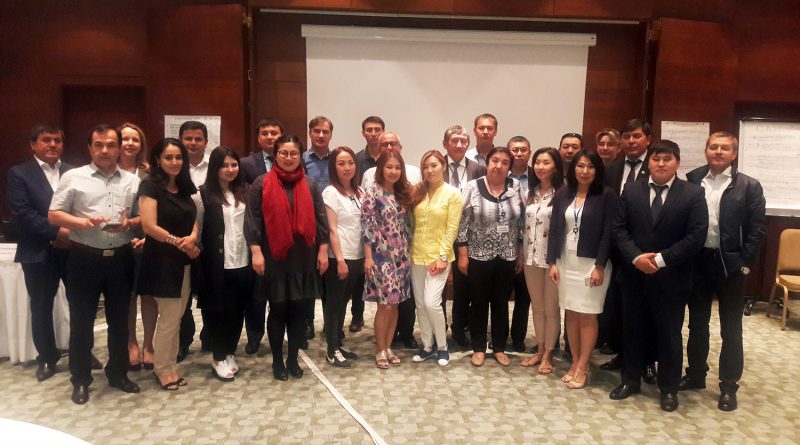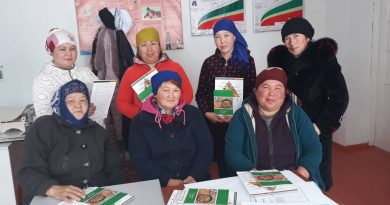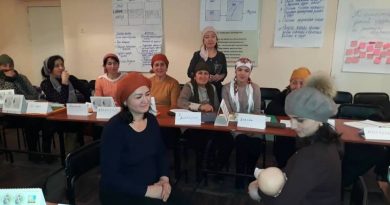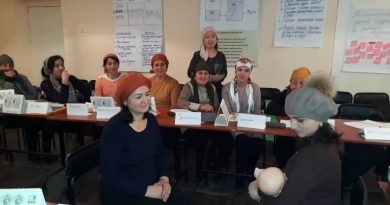Specialists of the Project Implementation Unit for “Agricultural Productivity and Nutrition Improvement Project” have participated in training course on topic: “Land allocation, resettlement and ensuring social sustainability” in Almaty city, Republic of Kazakhstan.
During the period from June 5 to 9, 2017 in Almaty, the Republic of Kazakhstan, a training course for the Groningen University Summer School was held on topic: “Land allocation, resettlement and ensuring social sustainability”. The course was organized by the initiative of the World Bank Group (IBRD, IFC and MIGA), University of Groningen and the Community Insights Group, and it was developed together with a group of social consultants (Intersocial Consulting) and Frederic Giovanetti.
Objective of the training course. Development of social issues management skills and risks caused by land acquisition and resettlement activities, familiarization with international standards and requirements regulating the process of resettlement and relocation. Experience exchange.
Participants of this training course were sociologists, environmentalists and specialists from other industries, Central Asian countries (Kyrgyzstan, Kazakhstan, Tajikistan and Uzbekistan) involved in the process of land allocation and resettlement. The training course was aimed at developing skills to manage social issues and risks caused by land allocation and resettlement activities as a result of private and public investment projects (mines, dams, highways, industrial parks, power lines, agricultural developments, etc.). During the training course the participants were introduced with international standards on resettlement, in particular the World Bank Policy, Performance Standards and IFC Safeguard Measures.
The training course trainers were:

Frederic Giovanetti |
Frederic Giovanetti – A graduate agronomist, an independent consultant on resettlement issues with 34 years of experience in Africa, Europe, as well as in India and Russian-speaking countries. Frederic has participated in many major projects around the world, for example, in the construction projects of the Rogun hydroelectric power station and Bujagali hydroelectric power station, the oil deposit development project in the Republic of Chad, the construction of the Baku-Tbilisi-Ceyhan oil pipeline and the South Caucasus gas pipeline, as well as construction projects of many large mining facilities. He manages the planning, implementation, monitoring and audit of activities for obtaining rights to land, compensation, resettlement and restoration of livelihoods on the order of both government agencies and private corporations. |
 Eddie Smith Eddie Smith |
Eddie Smith is the director of Intersocial Consulting LTD, a consulting company engaged in the planning and implementation of resettlement projects. Eddie has more than 20 years of experience in the management of social issues and environmental impact in more than 15 countries. Over the past 10 years, he has been planning, implementing, managing the implementation, auditing, examination and monitoring of numerous projects related to obtaining rights to land and resettlement in Europe, Africa, Latin America and Asia. Eddie also has extensive experience in managing the social impact of the project, working with stakeholders, restoring livelihoods and developing local communities. |

Vera Оgorodnikova |
Vera Ogorodnikova works as a consultant at CIG. She specializes in international development and socio-economic issues in the extractive sector. She participates in research projects, develops manuals, guidelines and training programs in the management of social issues of projects, including materials for the 2-week summer course on resettlement of the University of Groningen. Previously, she held the positions of senior development specialist at Deloitte Emerging Group in the UK, and a specialist in the government relations department at Chevron in Russia. |
The instructors have conducted presentations on key aspects of land allocation and resettlement such as:
- Key concepts and principles;
- IFO International standards and procedures;
- National policy, legislation and standards;
- Final assessment of environmental and social impact, cooperation with stakeholders;
- Project cycle of the World Bank, documentation requirements;
- Introduction into resettlement planning;
- Determination of the scale and impact of resettlement;
- Negotiations;
- Collect information on the background information;
- Rights and compensation frameworks;
- Land plots for accommodation of settlers and housing;
- Rehabilitation and development of sources of livelihood;
- Key steps on implementation, duties and responsibilities;
- Difficulties of resettlement projects which carried out by state bodies;
- Monitoring and audit.
Results:
- A good understanding and attention to the social consequences to which people or communities are being resettled or displaced;
- Good knowledge of international regulations and requirements governing the process of resettlement and relocation;
- Knowledge of procedures, methods and terminology used in the process of resettlement planning;
- A deeper understanding of the complex planning process and practical implementation issues related to the organization and conduct of resettlement;
- The ability to critically evaluate and use various sociological concepts related to resettlement;
- Understanding how closely resettlement knowledge is linked to a broader socio-cultural context, and therefore resettlement planning should be an integrated process aimed at ensuring sustainable development and improving the conditions for obtaining a livelihood.
The training course was held at the highest level. At the end of the training course, topical issues faced by resettlement specialists in Central Asian countries were discussed, as well as an exchange of views and experiences.
It was recommended that the organizers of this training course often organize such training for the professional development of specialists of projects financed by the World Bank Group.




